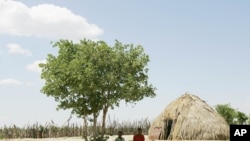U.S. officials say Sub-Saharan Africa is a center of global growth, home to many of the world’s poorest people, and a place where U.S. business investment and trade could help boost economic expansion. U.S. President Barack Obama is headed to Africa along with key U.S. economic officials and will meet American and African business executives.
Economists say many of the world’s fastest-growing economies are in Africa, and the potential for future growth - particularly outside the resource sectors - is greater than it has been in decades. Trade within Africa and with the United States is up and could grow more.
U.S. officials say rising African incomes and a growing middle class could boost demand for American-made products, and help create jobs in the United States.
But China has more trade with African nations, and some critics of U.S. policy say Beijing has made the continent more of a priority, and rarely imposes the kinds of political conditions on investments that come with some U.S. deals.
New U.S. Trade Representative Michael Froman says American companies offer deals that build a future.
“Africa wants investors, particularly American investors. They like the fact that when American companies invest, they hire, train and promote local staff, they invest in the communities and they're focused not just on taking resources out of Africa, but also in investing in human resources in Africa as well." said Froman.
Froman says these investments are not charity but “hard-headed” profit-oriented deals that participants expect to pay off.
The United States and other donors continue to send aid to help Africa’s poor. Froman says the flow of investment and trade is a critical part of the U.S. development strategy to reduce poverty.
“We need trade, not just aid; investment, not just assistance," he said.
The agenda for the trip includes talks on improving the rule of law. Companies say they are much more likely to succeed, grow and hire people if they have effective and predictable courts to settle business disputes.
Trade officials say they will discuss efforts to improve regional trade. One idea is to streamline the sometimes complex and slow process of paying tariffs on exports moving through Africa’s many nations, a problem that discourages exports and hurts economic growth.
Economists say many of the world’s fastest-growing economies are in Africa, and the potential for future growth - particularly outside the resource sectors - is greater than it has been in decades. Trade within Africa and with the United States is up and could grow more.
U.S. officials say rising African incomes and a growing middle class could boost demand for American-made products, and help create jobs in the United States.
But China has more trade with African nations, and some critics of U.S. policy say Beijing has made the continent more of a priority, and rarely imposes the kinds of political conditions on investments that come with some U.S. deals.
New U.S. Trade Representative Michael Froman says American companies offer deals that build a future.
“Africa wants investors, particularly American investors. They like the fact that when American companies invest, they hire, train and promote local staff, they invest in the communities and they're focused not just on taking resources out of Africa, but also in investing in human resources in Africa as well." said Froman.
Froman says these investments are not charity but “hard-headed” profit-oriented deals that participants expect to pay off.
The United States and other donors continue to send aid to help Africa’s poor. Froman says the flow of investment and trade is a critical part of the U.S. development strategy to reduce poverty.
“We need trade, not just aid; investment, not just assistance," he said.
The agenda for the trip includes talks on improving the rule of law. Companies say they are much more likely to succeed, grow and hire people if they have effective and predictable courts to settle business disputes.
Trade officials say they will discuss efforts to improve regional trade. One idea is to streamline the sometimes complex and slow process of paying tariffs on exports moving through Africa’s many nations, a problem that discourages exports and hurts economic growth.




